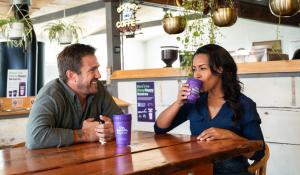
If anyone wanted to find Evan Delahanty in 2011, they would have had to fly to the country of Suriname, drive through the Amazon rainforest for several hours, and kayak down a river. There, in a small village, Delahanty was serving as a community economic specialist with the Peace Corps. When his term of service ended, he didn’t want to leave the villages he served behind.
Inspired by the açaí berry that grew wild in Suriname, Delahanty began to brainstorm a social enterprise that could produce healthy fruit snacks to nurture the earth and the body. He wanted to ensure that each snack could be ethically sourced directly from farmers in the Amazon rainforest and made with whole, organic, non-GMO fruits. With this idea, Peaceful Fruits was born.
Today, Delahanty’s business supports economic stability for two communities: the sustainable farmers in South America who supply the fruits and the adults with developmental disabilities who make the snacks in the US. The product is a fruit leather that comes in eight different flavors.
“We’re both a food business and mission-based business,” Delahanty says.
When Delahanty made his first few batches of fruit snacks in 2014, he gave out samples at a local farmer’s market for feedback. At the market, he met a young man named AJ with Down syndrome who loved the Peaceful Fruits story and product. AJ was a “champion label sticker-er” and wanted to help.
“It was one of those things that grew organically,” Delahanty says. “I didn’t start working with adults with disabilities because I had a particular tie. I just needed help and they’re great help.”
After joining Green America’s Green Business Network in 2016, Delahanty pitched his company on an episode of Shark Tank in 2017. While the sharks didn’t bite, the exposure led to further growth, tripling Peaceful Fruit’s annual revenue. The company was able to move to a private kitchen soon after and has hired four full-time employees and 29 part-time employees.
Peaceful Fruits partners with the Blick Center, which provides comprehensive services to people with developmental disabilities. For those in Blick’s Community-Based Supported Employment program, the company offers an opportunity to earn a paycheck at a full wage.
“All of the folks in our program have either never had the opportunity to work competitively or have failed on multiple occasions when given the opportunity to work in the community,” says Bonny King, licensed occupational therapist and lead of the program. “We have been able to modify tasks and match the right people with the right task so that [they] can be successful.”
“For a lot of our folks, it’s more about the therapeutic and human benefits of being on a team and working in an organization than getting a paycheck,” adds Delahanty. Nevertheless, he believes a full wage is crucial. “As a CEO, it’s my responsibility to figure out how to make money while meeting those thresholds of being a good corporate citizen. It’s important for me to pay people first.”
Kim Smith is a participant in the Community-Based Supported Employment program and is one of Peaceful Fruits’ star employees.
“Peaceful Fruits has impacted me in such a great way,” she says. “I never thought I’d be able to have a full-time job working five days a week, and with Peaceful Fruits I’ve realized I can do that.”
Today, Delahanty manages company growth, production, and oversees recipes among a handful of other responsibilities. Increasingly, his job is to be the advocate and storyteller.
“[Social enterprises are] the future of doing business,” Delahanty says, “because it’s the only way that is truly sustainable as individuals, as communities, and ultimately as a planet that has finite resources.”







